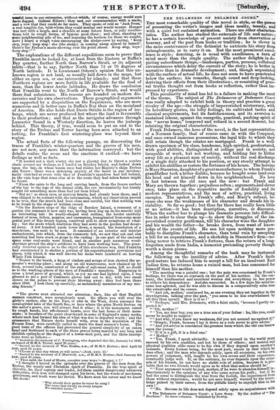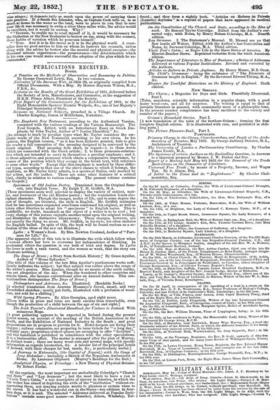THE DELAXERES OF DELIMERE COURT. *
TEE most remarkable quality of this novel is style, or the power -of presenting the writer's images and ideas neatly, tersely, and with a quiet but sustained animation. There are other character- istics. The author has studied the externals of life and nature ; he has a certain knowledge of present society from observation or hearsay, and of the past from books or tradition ; he is clever in the mere contrivances of the fictionist to extricate his story from entanglements, or to carry it on. But the most prominent excel- knee is style ; denoting, as is usual with excellences, a turn of mind more than the single quality. The author delights in de- picting subordinate things,—landscapes, parties, persons, collateral circumstances which delay the current of the story; he is better ia narrative than in dramatic development ; and, though acquainted with the surface of actual life, he does not seem to have penetrated below the surface; his remarks, though sound and deep-looking, deriving their -effects from their illustrations, or consisting of gene- ral truths thought out from books or reflection, rather than im- pressed by experience. This peculiarity of mind has led to a failure in making the most
of the theme. The subject of The Delarneres of Delamere Court was really adapted to exhibit both in theory and practice a great rivalry of the age—the struggle of impoverished aristocracy, with its hereditary glories, its lofty feelings, its cultivated tastes and classical acquirements, but its fastidiousness, and its aversion to sustained labour, against the energetic, practical, pushing spirit of the " novas homo,' tempered and refine(' in a second descent, but retaining the original characteristics. Frank Delamere, the hero of the novel, is the last representative of a Norman family, that of course came in with the Conquest, and once owned immense possessions, the legal title to which they still retain though the estates are mortgaged. Frank is a well- drawn specimen of his class, handsome, high-spirited, goodnatured, with good abilities, distinguished at college and in society, not incapable of work, hitt not working, and bidding fair to fritter away life as a pleasant man of society, without the real discharge of a single duty attached to his position, or any steady attempt to exhibit his abilities or restore the fortunes of his house. The heroine is Mary Staunton, daughter of a great manufacturer, to whom Frank's grandfather took a bitter dislike, because he bought some land over his head and set himself down in his neighbourhood. No love is lost between the old race and the new : but Frank and Mary are thrown together; prejudices soften ; arguments,and clever ones, take place on the respective merits of fendality and its modem representatives, and the men of active, practical, living energies. The upshot is Frank's offer, and Mary's refusal, be- cause she sees the weaknesses of his character and dreads his in- stability. So far so good ; but thus far there has really been little or no action—it has been description, narrative, or discourse. 'When the author has to plunge his dramatis personte into difficul- ties in order to clear them n.p—to show the struggles of the ha- poverished country gentleman, till lila character wins the daughter and his wealth the father—he breaks down, from want of know- ledge of the events of life. Re can hit upon nothing more pro- bable to discipline Frank's character, than total rain by accepting a bill for an acquaintance, and a clerkship in Staunton's firm—no- thing newer to retrieve Frank's fortune, than the return of a long- forgotten uncle from India, a humorist pretending poverty though worth a dozen plums.
Among the thoughtful remarks of the book may he instanced the following -on the inutility of advice. After Frank's facile good-nature has induced him to accept a bill for an insolvent East Indian firm, he returns home a ruined man, hatless concerned for himself than his mother.
"The meeting was a painful one ; but the pain was occasioned by Frank's feelings, for there was no reproach on the part of his mother. On the con- trary, the kindhearted and excellent woman did everything in her power to relieve his despondency. And she succeeded. In a few days his mind be- came less agitated, and he was able to discuss in a comparatively calm tone the catastrophe and its causes. "'And yet, mother,' continued he, as one evening they sat together in the drawingroom, talking over the past, you seem to be less overwhelmed by all this than myself. How is it so ? ' "'Perhaps,' said Mrs. Delamere, with a faint smile, because I partly ex- pected it.'
""Oh, mother ! ' " ' Yes, my dear boy, you are a true son of your father : he,like you, could never be taught to suspect.'
"4 And why, if you knew my weakness, did you not counsel meagainst it? 4' Simply, Frank, because I lay it down as a rule never to give advice.' 4" And yet advice is considered the greatest boon which the old can bestow
upon the young,'
" If it is a gift, it is a fatal one.' 4" Mother !'
"'Yes, Frank, I speak advisedly. A man to succeed in 'the world must succeed by his own qualities, and not by those of others • and mental and physical qualities alike cease to be his own if they depend upon another 's counsels. Every human being, for the most part, excels in that which he does often ; and the man who depends solely, upon all occasions, on his own powers of judgment, will, taught by his own errors and their experience, eventually judge well. If, on the contrary, he ever depends upon the coun- sels of his friends, he can have no stable rule of action, because it is pro- bable that no two friends would agree as to what that action should be.' "Your argument would be just, mother, if he were to abandon hinuielf in to the opinions of any who came across his path ; but if he had the sense to distinguish the wise from the foolish, the experienced from those without experience, would he not save himself, warned by the know- ledge gained by their career, from the pitfalls likely to engulph him in his own ? '
"'No. Success in life does not depend solely upon an acquaintance with
"1 The Delameres of Delamere Court: a Love Story. By the Author of "The Duchess." In three volumes. Published by Newby. wise adages ; it depends tally as much upon the power of carrying them into practice. If a South Sea Islander, who, as Captain Cook tells us, is as much at home in the water as the land, were to prove to you that to save vour life it was necessary to swim a river three miles wide, the advice would be excellent, but it would be useless. Why ? '
" ' Because, to enable me to avail myself of it, it would be necessary for the -Otaheitan or the New Zealander to bestow on me, along with the counsel, those habits of natation which be possesses himself.' " True. And it is in the moral as it is in the physical world. A coun- sellor does no good service to him on whom he bestows his counsels, unless along with the advice he bestow also the mental and physical energies—the thousand minute experiences—the perseverance—the determination which in his own case would make successful the adoption of the plan which he re- commended.'



























 Previous page
Previous page